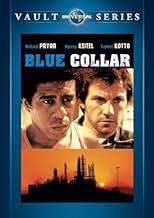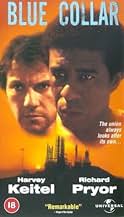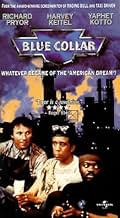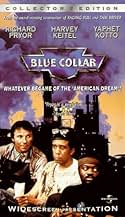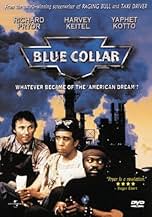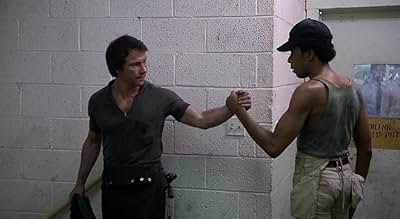IMDb-BEWERTUNG
7,5/10
11.296
IHRE BEWERTUNG
Als drei Arbeiter versuchen, die örtliche Gewerkschaft zu bestehlen, entdecken sie stattdessen die Korruption der Gewerkschaft und beschließen, sie zu erpressen.Als drei Arbeiter versuchen, die örtliche Gewerkschaft zu bestehlen, entdecken sie stattdessen die Korruption der Gewerkschaft und beschließen, sie zu erpressen.Als drei Arbeiter versuchen, die örtliche Gewerkschaft zu bestehlen, entdecken sie stattdessen die Korruption der Gewerkschaft und beschließen, sie zu erpressen.
- Auszeichnungen
- 1 Gewinn & 2 Nominierungen insgesamt
Handlung
WUSSTEST DU SCHON:
- WissenswertesIt was a very tense shoot, because Richard Pryor, Yaphet Kotto, and Harvey Keitel argued constantly. There were fights, verbal abuse, walk-offs, and Mexican stand-offs. According to Paul Schrader, Pryor punched Keitel and hit Kotto with a chair during filming.
- PatzerWhenever the actors use air powered tools, the tools just spin in mid-air.
- Zitate
[last lines]
Smokey James: [voiceover echoing earlier line] They pit the lifers against the new boy and the young against the old. The black against the white. Everything they do is to keep us in our place.
- VerbindungenFeatured in At the Movies: Special Show: At the Cassette Store, Part 3 (1986)
- SoundtracksHard Workin Man
Music by Jack Nitzsche
Lyrics by Jack Nitzsche, Ry Cooder and Paul Schrader
Performed by Don Van Vliet (as Captain Beefheart)
Ausgewählte Rezension
I had to admit something to myself after watching Blue Collar; that I have preconceptions about any movie starring Richard Pryor. Pryor made so many silly comedies like "Stir Crazy" and "Moving" I tend to want to dismiss or label every movie in which he appeared...bad move. Blue Collar is a highly entertaining film that works on several levels. Most of all it scores as a raw, gritty, muckraking type of film exposing the corruption of labor unions and corporate America. Secondly, it works pretty well on a comedic level, but its funny because it's real. The acting here is top notch and Pryor really stands out, and as good as Harvey Keitel is as an actor, Pryor matches him step for step.
Zeke, Jerry and Smokey (Pryor, Keitel and Yaphet Kotto) are three buddies working for the Auto union at Checker Automotive. (a real car maker that allowed the movie to be filmed at their plant, after the big three rejected it) By day, they weld, paint and rivet, by night, they drink and party and concoct schemes to get ahead financially. Eventually they stumble upon a ledger that contains proof that their union is corrupt. They decide to blackmail the union bosses and things start to get complicated. At this point, the film starts to take a more serious tone as the union fights back in a way nobody expected. Zeke is the only one of the three the union bosses are very concerned about and soon he is being offered a promotion.
Pryors even-keeled performance is the key to the film. He's tough and unflappable but smart enough to know when to give in to the powers that determine his fate. His decisions aren't necessary the ones you expect out of a Hollywood movie, but they are the ones that would likely be made in real life....and thats part of the tragedy.
Another great aspect of Blue Collar is the bluesy soundtrack by Jack Nitzsche, with guitar work by the legendary Ry Cooder and the title track performed by Captain Beefheart. The establishing scenes over the opening credits are highlighted by the blues soundtrack with actual punch press sounds incorporated into the music. Its really unique... and a special nod needs given to director Paul Shrader, who handles the films change in tone nicely, and gives the film a tightness and realism that keeps our attention focused throughout.
The movie Blue Collar, viewed today, is like a living time capsule from the 1970s. Lynyrd Skynyrd on the Jukebox, "Good Times" on the TV and Strohs Beer being served at the local Bar. Blue Collar will have a special significance for those who (like me) are from the Midwest...the rust belt. This all seems so familiar, the mindset of these union workers, the us against them mentality...feeling defeated by the system...too far in debt to go a different route in life.
Some of the characters here remind me of the fathers of some of the kids I grew up with. It left me contemplating the question -were we better off when the auto unions were stronger or not? 'real wages' haven't gone up in nearly 40 years. We lose more jobs overseas every year. Were the times depicted in Blue Collar actually the "good old days"?...or more like, the last of the good old days?
When Smokey makes his cryptic speech about "the old being pitted against young, black being pitted against white, everything they do is to keep us in our place"...He isn't just talking about the labor unions, I think he is talking about the whole system itself. Scary thought.
Zeke, Jerry and Smokey (Pryor, Keitel and Yaphet Kotto) are three buddies working for the Auto union at Checker Automotive. (a real car maker that allowed the movie to be filmed at their plant, after the big three rejected it) By day, they weld, paint and rivet, by night, they drink and party and concoct schemes to get ahead financially. Eventually they stumble upon a ledger that contains proof that their union is corrupt. They decide to blackmail the union bosses and things start to get complicated. At this point, the film starts to take a more serious tone as the union fights back in a way nobody expected. Zeke is the only one of the three the union bosses are very concerned about and soon he is being offered a promotion.
Pryors even-keeled performance is the key to the film. He's tough and unflappable but smart enough to know when to give in to the powers that determine his fate. His decisions aren't necessary the ones you expect out of a Hollywood movie, but they are the ones that would likely be made in real life....and thats part of the tragedy.
Another great aspect of Blue Collar is the bluesy soundtrack by Jack Nitzsche, with guitar work by the legendary Ry Cooder and the title track performed by Captain Beefheart. The establishing scenes over the opening credits are highlighted by the blues soundtrack with actual punch press sounds incorporated into the music. Its really unique... and a special nod needs given to director Paul Shrader, who handles the films change in tone nicely, and gives the film a tightness and realism that keeps our attention focused throughout.
The movie Blue Collar, viewed today, is like a living time capsule from the 1970s. Lynyrd Skynyrd on the Jukebox, "Good Times" on the TV and Strohs Beer being served at the local Bar. Blue Collar will have a special significance for those who (like me) are from the Midwest...the rust belt. This all seems so familiar, the mindset of these union workers, the us against them mentality...feeling defeated by the system...too far in debt to go a different route in life.
Some of the characters here remind me of the fathers of some of the kids I grew up with. It left me contemplating the question -were we better off when the auto unions were stronger or not? 'real wages' haven't gone up in nearly 40 years. We lose more jobs overseas every year. Were the times depicted in Blue Collar actually the "good old days"?...or more like, the last of the good old days?
When Smokey makes his cryptic speech about "the old being pitted against young, black being pitted against white, everything they do is to keep us in our place"...He isn't just talking about the labor unions, I think he is talking about the whole system itself. Scary thought.
Top-Auswahl
Melde dich zum Bewerten an und greife auf die Watchlist für personalisierte Empfehlungen zu.
- How long is Blue Collar?Powered by Alexa
Details
Box Office
- Budget
- 1.700.000 $ (geschätzt)
- Bruttoertrag in den USA und Kanada
- 6.521.083 $
- Weltweiter Bruttoertrag
- 6.521.083 $
Zu dieser Seite beitragen
Bearbeitung vorschlagen oder fehlenden Inhalt hinzufügen

Oberste Lücke
By what name was Blue Collar - Kampf am Fließband (1978) officially released in India in English?
Antwort


